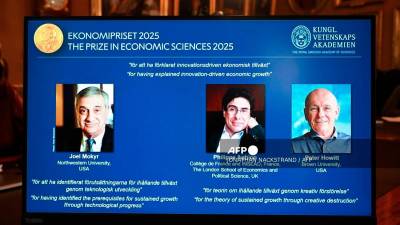STOCKHOLM: The Nobel prize in economics was awarded to American-Israeli Joel Mokyr, France’s Philippe Aghion and Canada’s Peter Howitt for their research on technology’s impact on sustained economic growth.
Mokyr received one half of the prize for identifying the prerequisites for sustained growth through technological progress.
Aghion and Howitt shared the other half for developing the theory of sustained growth through creative destruction.
Prize committee chair John Hassler stated their work answers fundamental questions about how technological innovation drives economic growth.
The Royal Swedish Academy of Sciences noted Mokyr used historical sources to uncover why sustained growth became the new normal.
Aghion and Howitt examined creative destruction, where new and better products displace older ones in the market.
The economics prize differs from the original five Nobel prizes established in Alfred Nobel’s 1896 will.
Sweden’s central bank created the economics prize through a donation in 1968, leading some critics to call it a false Nobel.
However, the Royal Swedish Academy of Sciences selects the winner using the same rigorous process as the chemistry and physics prizes.
This year’s economics award concludes the Nobel season that recognised achievements across multiple disciplines.
The literature prize honoured Hungarian author Laszlo Krasznahorkai for his explorations of postmodern dystopia.
Venezuelan opposition leader Maria Corina Machado received the closely watched Nobel Peace Prize.
Machado surprisingly dedicated her peace prize to US President Donald Trump, who had openly expressed his desire for the award.
Each Nobel economics laureate receives a diploma, gold medal and $1.2 million cheque.
The winners will collect their prizes during formal ceremonies in Stockholm and Oslo on December 10.
December 10 marks the anniversary of Alfred Nobel’s death in 1896 when he established the prizes in his will. – AFP
